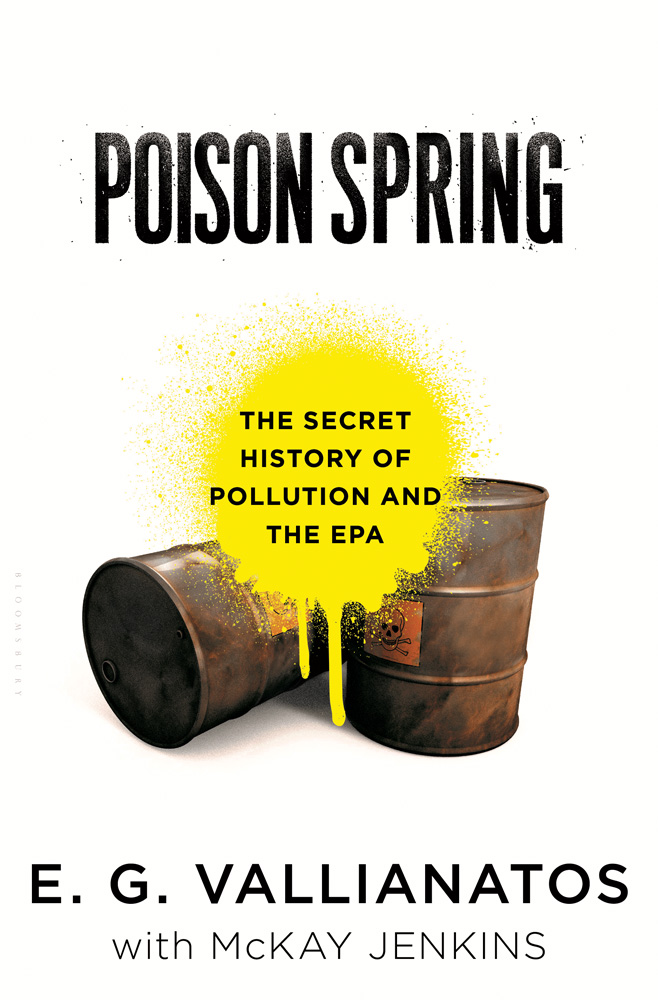
Poison Spring
The Secret History of Pollution and the EPA
کتاب های مرتبط
- اطلاعات
- نقد و بررسی
- دیدگاه کاربران
نقد و بررسی

Starred review from February 10, 2014
Vallianatos, after a 25-year stint at the Environmental Protection Agency, pulls back the curtain on the watchdog agency’s failure to guard public safety and monitor land use due to steady erosion of its enforcement practices. With environmental journalist Jenkins he blasts the EPA’s ineptitude since its 1970 inception, intensely pressured as it is by politicians and corporations to approve the use of synthetic chemicals without proper testing—“biologic death bombs” in the air, water, and in our bodies. The EPA, through its Congressional mandate, enforces more than a dozen environmental laws, yet it has approved hundreds of pesticides that have been used unnecessarily, excessively, or which have been outright abused, the book contends. Vallianatos does give the agency credit for the hard-fought ban on DDT that was opposed by the chemical companies and pesticide apologists. He also explores the causes of the dwindling honeybee population and the loss of the traditional family farms to the aggressive corporate giants, as well as the repression of EPA whistleblowers squashed by a code of silence and lack of access to information. The authors tout healthier living through small, nontoxic family farms while delivering an alarming, comprehensive account of a “fatally compromised” EPA mission crippled by bad enforcement practices and numerous corrupting influences.

March 1, 2014
"We spend our lives living in a chemical soup," writes Vallianatos (This Land Is Their Land: How Corporate Farms Threaten the World, 2006, etc.), who was a risk evaluator for the Environment Protection Agency from 1979 to 2004. With Jenkins (Journalism/Univ. of Delaware; What's Gotten Into Us: Staying Healthy in a Toxic World, 2011), he excoriates the agency for routinely yielding to outside pressure in regulating pesticides and other environmental pollutants. Founded in 1970, the EPA inherited Department of Agriculture personnel who brought their enthusiasm for chemical farming. Dedicated scientists arrived, but their findings are never the last word. That belongs to their superiors, who weigh evidence of an agent's toxicity against industry spokesmen and fierce opposition of administration and Congress to "burdensome government regulation" and "attacks on the farmer." The authors recite a depressing litany of poisons approved despite damning, inadequate or fraudulent testing--and often no testing at all. EPA whistle-blowers, always portrayed as heroes, are usually ignored, demoted or fired. Although President Ronald Reagan's effort to abolish the EPA failed, he weakened it dramatically. Abolition remains the goal of many Republicans, while Democrats oppose this plan. However, Democratic presidents, Barack Obama included, have proven a disappointment. Sadly, a minority of environmentalists excepted, Americans rarely pester their representatives about this subject or contribute to their campaigns. Agribusinesses and chemical manufacturers do both. Even an impartial EPA official--rare in this damning indictment--hears mostly one side of an argument. In the obligatory how-to-fix-it conclusion, Vallianatos and Jenkins suggest that the EPA should be run like the Food and Drug Administration and Federal Reserve--by experts, not political appointees. This is not likely. Readers of this overheated but often on-the-mark polemic will conclude that the safest tactic is organic food and a fly swatter.
COPYRIGHT(2014) Kirkus Reviews, ALL RIGHTS RESERVED.

March 1, 2014
Like biologist Rachel Carson, Vallianatos (Harvest of Devastation), former staff scientist at the Environmental Protection Agency (EPA), and Jenkins (Cornelius Tilghman Professor of English, Journalism & Environmental Humanities, Univ. of Delaware; What's Gotten into Us: Staying Healthy in a Toxic World) sound the alarm about toxins in common use. Vallianatos, who worked at the EPA to regulate pesticides, details a failure to safeguard the U.S. environment or defend public health. According to the authors, EPA executives have refused to ban or restrict dangerous ingredients in insecticides, herbicides, and fungicides. EPA scientists have been disciplined or reassigned for pointing out such dangers. Falsified data from contract laboratories has been used to approve toxic pesticides that get into food and drinking water. Both Vallianatos and Jenkins name names and document reckless behavior by chemical corporations and their government protectors. They question the effectiveness of chemical pesticides that damage many species while the targets become resistant. VERDICT Reading this whistle-blowing account by a former insider requires a tolerance for details about office politics and scientific terminology. The payoff for concerned readers is an indictment that implicates pesticides in wildlife and livestock die-offs, as well as in human maladies and deaths.--David R. Conn, formerly with Surrey Libs., BC
Copyright 2014 Library Journal, LLC Used with permission.

























دیدگاه کاربران